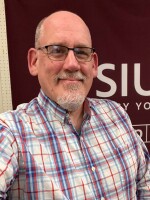WSIU attended Katie Moore's American Sign Language class at SIU. She begins class with review. She points to a word and the students move their hands and practicing facial expressions to make the correct sign.
It's nothing out of the ordinary when it comes to teaching a new language. But...this...is a topic close to the heart of Assistant professor Katie Moore.
You see, Katie is deaf, having lost her hearing around the age of four.
For this interview she signs her responses to my questions - quietly mouths the words. Erin Stumpf helps with translating.
Katie is starting her second year at SIU as one of two deaf professors on a team of three teaching ASL and deaf culture at the university.
Teaching students is not where Katie expected to be, but..."I feel like this is what I enjoy doing. I want to make a difference with my students, and I feel like I can do that."
This May, Katie received her doctorate from the University of Illinois - always a big accomplishment. But, when you look at the statistics, you can see how big it really is.
According to data by the National Deaf Center, deaf people earn post secondary degrees at half the rate of the hearing population. In 2023, 23 percent of deaf people earned bachelor's degrees compared to 38 percent of hearing people. The gap widens as the degree level advances. For example 2% of deaf people earn doctorates compared to 4% of those who can hear.
While the numbers seem stark, Katie explains the reasons behind the disparity that the numbers can't tell you, "There's a lot of imposter syndrome being good enough, being smart enough. There's a lot of people who have told me throughout my life that I'm not smart, that I won't be successful. So that had a big impact on me. And in my experience. Another is interpreting accessibility. With my PhD level work in education. You can't just hire any interpreter because the interpreter is my voice. If that interpreter chooses the wrong word. If they're not a good fit for my level, then it affects how people view me."
The challenges Katie faced in junior high and high school prepared her to handle these challenges. She eventually attended and graduated from the Illinois School for the deaf in Jacksonville, IL, "I was exposed to deaf culture, which was incredible for me. When I went into the school for the deaf, I started meeting other people that were just like me. They had their own culture, their own language. It was like being in a different world and I couldn't believe it."
She went on to earn her bachelors degree from U of I. Like many graduates, she wasn't sure what she wanted to do. An internship with Disney brought out her desire to interact with people. While working a job completing real estate title work, Katie was approached by a former teacher about a job teaching sign language to high schoolers. She felt she wasn't ready to tackle teaching, but if no one took the teaching job, they would get rid of the ASL classes, "I had no teacher training, nothing. So I said, okay, fine, I'll try. We'll see what happens. And I fell in love with it. I just fell in love with teaching. So I taught at Jacksonville High School for six years."
This call led her to expand her knowledge of teaching pursuing a masters and then doctorate--All in a hope to expand her impact on her students and the deaf community, "My experience with not having full language access and having to get by with communication, I think has made me a better teacher because I understand and I want to work with students. I want to help them understand the deaf experience, what those frustrations are, what the barriers are."
Katie doesn't shy away when I ask her if she sees herself as an inspiration for other deaf people, "I'm out there. I want other people to see it and know it's not impossible. And there's several reasons. There's barriers. There's the imposter syndrome, interpreters, language access. I think right now people are seeing it through social media, which has had a huge impact. Before, you would never see deaf people, you never saw a signing. And now we're much more visible. I think that's made a big difference. Hopefully those people who are saying, oh, I can't are getting more examples and are spurred on to get their degree because they see that other people have done it so they can do it too."
Back in class, it's been a quiet 55 minutes. But in that time, there's been a snowball fight, learning, giggling, ending with a goodbye from Katie telling her students to have a fun weekend.




